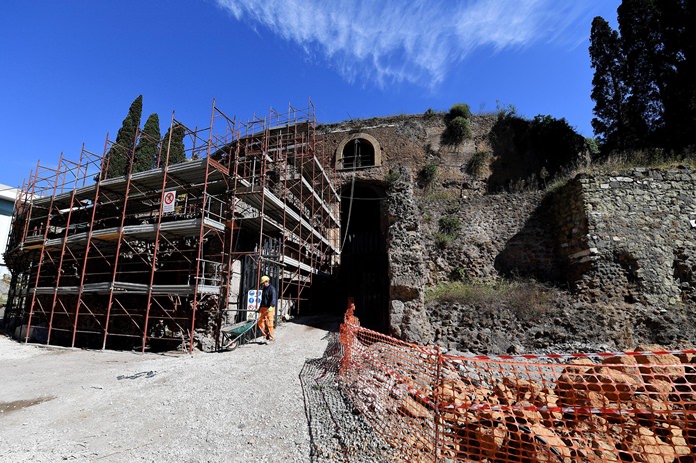Rome (AP) – The mausoleum of Emperor Augustus, a towering monument when it was built in 28 B.C. but long a decrepit eyesore in Rome’s historic center, is being restored. The 10-million-euro public-private facelift is expected to be completed in 2019.

The structure, located along the Tiber River, is made up of circular, vaulted corridors with the sepulcher in the center. It has been covered with trees, weeds and garbage and closed to the public since the 1970s because of safety concerns.
Its restoration is being financed by the city of Rome, the culture ministry and a 6 million-euro donation from the TIM phone company.
Last week, Mayor Virginia Raggi donned a protective helmet and paid a visit. “I hope the mausoleum will be given back as soon as possible to the people,” she said.
Augustus had the mausoleum built for himself and the imperial family, and it also houses the bones and ash of Emperors Vespasian, Nero and Tiberius, each indicated with a marble plaque.
The structure, originally 90 meters in diameter and 45 meters high, originally featured a bronze sculpture of Augustus on the roof. Its location a stone’s throw from the Tiber gave it maximum visibility around the city of Rome.
Over the centuries it was used as a fortress, for bullfights and for concerts. Fascist dictator Benito Mussolini, eager to revive Roman imperial glory, restored the area and built a square piazza around it called Piazza Augusto Imperatore, which today houses upscale restaurants and shops.
But the mausoleum itself was shut down in the 1930s, fenced off and left in disrepair.
In the first phase of the restoration, workers cleaned out the garbage and cut back the trees and weeds that grew up inside. Phase two involves installing electricity and a cover.
The restored mausoleum will have an adjoining museum, elevators and a shop, making it a convenient stop alongside the nearby Ara Pacis altar which received a Richard Meier-designed protective covering a decade ago.
Augustus was 35 when he had the mausoleum built, shortly after his victory in the naval Battle of Actium, where he defeated the fleets of Antony and Cleopatra, consolidating his power and making him the undisputed leader of the Roman Empire.




